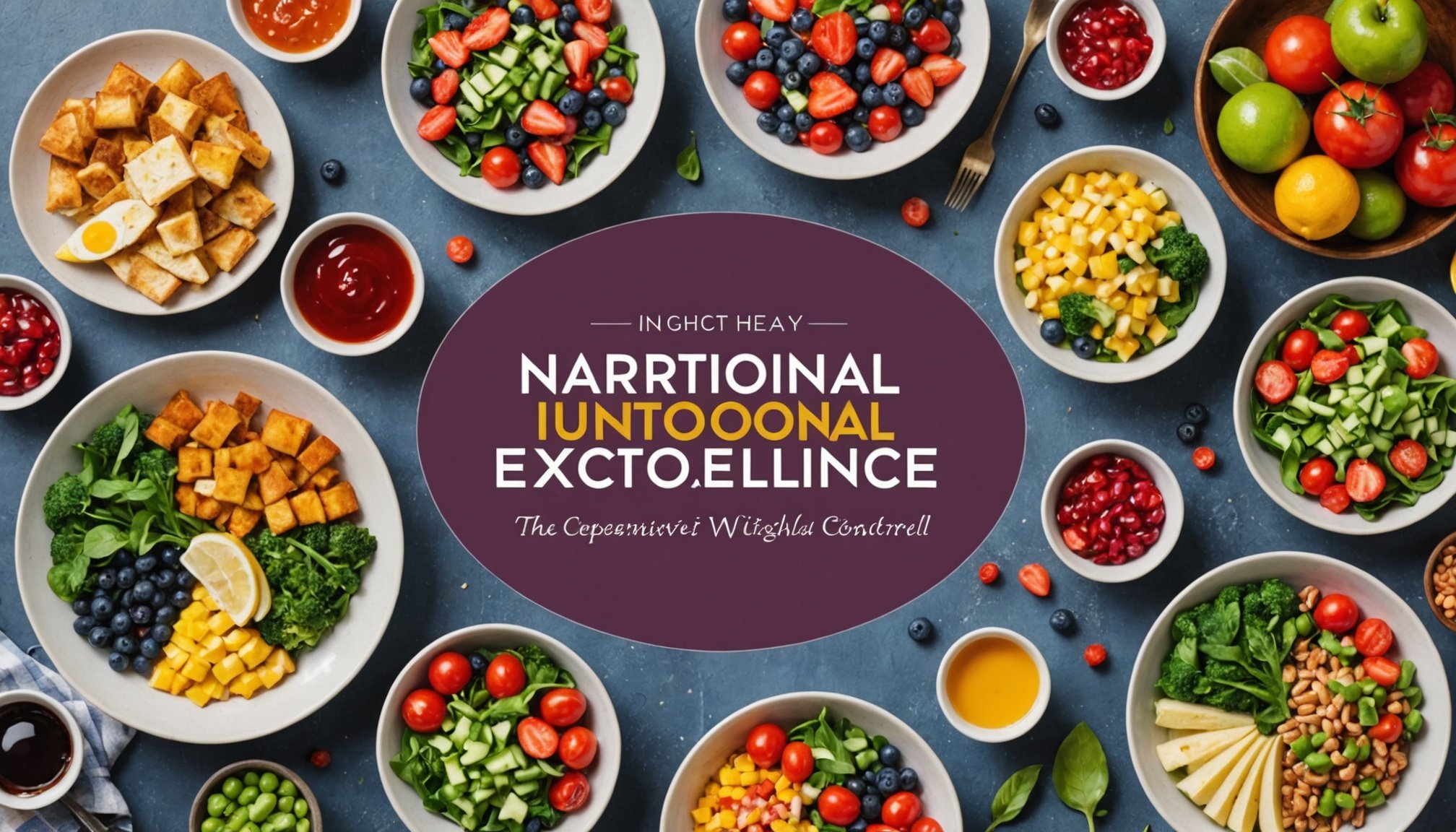Understanding Nutritional Principles
Nutritional Fundamentals are the building blocks of a healthy lifestyle. At its core, nutrition is the science of how food affects our bodies and overall health. Understanding macros and micros is essential in this realm. Macronutrients include proteins, carbohydrates, and fats, which provide energy and repair tissues. Meanwhile, micronutrients such as vitamins and minerals perform vital roles including immune function and bone health.
A balanced diet requires incorporating various essential food groups. Grains, vegetables, fruits, proteins, and dairy each contribute unique benefits. Each food group plays an important part, with grains providing energy, fruits and vegetables offering vitamins and fiber, and proteins supporting growth and tissue repair. These components of the food pyramid ensure that energy levels remain adequate, and bodily processes function efficiently.
Also to see : Unlocking Space: Expert Strategies for Revolutionizing Your Small Closet Organization
Understanding and respecting these nutritional principles can lead to improved health outcomes and a more satisfying relationship with food. By focusing on balanced contributions from each food group and acknowledging the fundamental role of macronutrients and micronutrients, individuals can stride confidently toward better health and wellness. This approach paves the way for more effective dietary habits and enduring well-being.
Meal Planning for Success
Planning meals is a cornerstone of achieving nutritional goals. Incorporating meal preparation into your routine can optimize how effectively you meet those objectives. A well-thought-out strategy helps you craft a balanced diet, ensuring you consume necessary nutrients without veering off-track. Begin by assessing your nutritional needs and choosing a variety of foods that cover all essential food groups.
Also read : Unlock Ultimate Fitness: Pro Strategies to Combine Cardio and Strength Training for Optimal Health Benefits
Portion control plays a critical role in meal planning, influencing energy intake and maintaining proper nutrition balance. Tips for mindful portioning include using smaller plates and pre-measuring portions to avoid overeating. Another effective approach is to visualize your plate as divided into sections, dedicating half to vegetables, a quarter to proteins, and the remaining quarter to whole grains.
Meal prep can amplify these efforts by streamlining daily nutrition. By cooking and storing meals ahead of time, you eliminate the guesswork and make healthy choices more convenient. Consider dedicating time each week to prepare ingredients or complete meals that can be easily reheated. This foresightedness supports consistent habits and reduces reliance on last-minute, less nutritious alternatives. It’s a strategy that not only promotes healthy eating habits but also saves time.
Healthy Recipes for Every Meal
Creating nutrient-dense recipes for daily meals can significantly enhance your health journey. By focusing on thoughtful cooking techniques and accommodating dietary preferences, preparing versatile dishes becomes enjoyable and rewarding.
Breakfast Options
Kickstart your day with quick, nutritious breakfast ideas. Incorporate whole grains, like oatmeal, and proteins, such as eggs or Greek yogurt, to fuel your morning effectively. Smoothies enriched with leafy greens and fruits can provide an energy-boosting alternative.
Lunch and Dinner Choices
For lunch and dinner, simple yet healthy recipes emphasize balance and variety. Consider grilled chicken salad, adding an array of colourful vegetables and a sprinkle of nuts for extra crunch. Fish tacos, using whole-grain tortillas and a generous portion of slaw, offer a tasty, balanced meal rich in omega-3.
Snacks and Desserts
Healthy snack options are key to maintaining energy throughout the day. Munch on almond butter paired with apple slices, or opt for a handful of trail mix. When it comes to desserts, explore guilt-free recipes, like Greek yogurt parfaits with berry compote, that are satisfying yet light on calories. Prioritizing ingredients that cater to both nutrition and flavour can transform everyday eating into a culinary delight.
The Art of Mindful Eating
Mindful Eating is not just about consumption—it’s about cultivating a deeper awareness of the food and the eating experience. By applying mindful eating strategies, individuals can fine-tune their eating habits and genuinely enjoy their meals. But what are these strategies, and why do they matter?
At its essence, mindful eating involves paying full attention to the eating experience, savoring each bite and recognizing hunger and satiety signals. It encourages slowing down and appreciating the food’s flavors, textures, and aromas. Such awareness can lead to healthier eating habits and a more enjoyable food experience.
Implementing mindful techniques can offer significant health benefits. Being in tune with one’s hunger can aid in weight control, reducing the likelihood of overeating. Additionally, appreciating the food encourages satisfaction with smaller portions, aligning with long-term weight control strategies. By becoming more conscious in our dining experiences, we honour our body’s signals and promote better well-being.
Whether it’s putting down utensils between bites or reflecting on the food’s origins, mindfulness shifts the focus from mere consumption to meaningful engagement. Adopting these practices can transform not just the meal itself, but also our relationship with food.
Enhancing Engagement with Visual Aids
Visual aids can significantly improve the way we comprehend and retain nutritional information. Graphs and charts serve as invaluable tools, simplifying complex data and providing clear insights. For instance, using a pie chart to display your macronutrient intake can highlight any imbalances in your diet, allowing you to make informed adjustments.
Interactive elements are another powerful resource. These tools, like digital meal planners, can guide you in creating a balanced diet by suggesting recipes and portion sizes based on your nutritional needs. Such aids can transform theoretical knowledge into practical applications, enhancing your ability to adopt healthier eating habits.
In addition, visual learning aids, such as infographics, distill large volumes of information into digestible pieces. For example, an infographic detailing food group benefits can act as a constant reminder of how each contributes to overall well-being. These tools not only clarify data but also make it engaging and accessible.
The use of visual aids fosters a deeper understanding of nutrition, helping individuals track progress accurately. By integrating these interactive tools and visual resources into daily life, achieving nutritional goals becomes more tangible and motivating.
Effective Weight Management Techniques
Achieving and maintaining a healthy weight involves more than just dieting; it requires adopting effective weight control strategies. Setting realistic goals is essential for long-term success. Begin by identifying a target weight that aligns with your body type and lifestyle, ensuring it’s both attainable and sustainable. Tracking progress through methods like food diaries or digital apps can keep you accountable and motivate you over time.
Behavioral changes form the backbone of successful weight management. Incorporate simple habits, such as eating slowly to recognize fullness cues or incorporating more physical activity into daily routines. Reducing portion sizes or cutting down on high-calorie snacks can contribute to a healthier journey. Remember, small, consistent changes often lead to significant results.
Sustaining weight loss is more achievable when realistic objectives are paired with effective strategies. It promotes a mindset where progress is celebrated, and setbacks are learning experiences. Through understanding personal habits and making informed choices, one can achieve not just weight loss, but a healthier, more balanced lifestyle. Behavioral changes coupled with proper goal setting lay the groundwork for enduring health achievements.
Success Stories and Testimonials
Real-life examples can serve as powerful motivators on the journey to nutritional excellence. Imagine someone who transformed their health by committing to a balanced diet and consistent physical activities. Such inspiring narratives illuminate the path for others seeking similar outcomes.
Health transformations often begin with small, sustainable changes. Take, for instance, an individual who once struggled with weight management but embraced portion control and nutritionally rich foods. Over months, they not only shed excess weight but also reported increased energy and improved mental clarity. These transformations highlight how progressive lifestyle adjustments can yield profound benefits.
Motivational insights from these stories emphasize not only personal resilience but also the value of community support. Whether through online forums or local groups, having a network to share experiences and challenges can strengthen commitment to healthier choices. This community encouragement plays a vital role in nurturing optimism and perseverance.
By understanding these strategies employed—like realistic goal-setting and implementing behavioural changes—others can draw inspiration and concrete ideas for their wellness journey. Ultimately, these testimonials remind us of the achievable potential for lasting health changes.











